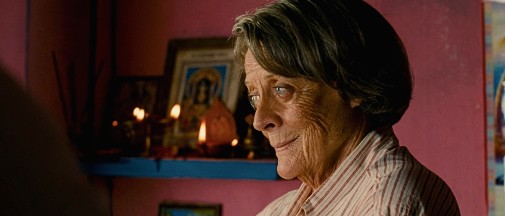
It's time to wish a happy anniversary to The Best Exotic Marigold Hotel. John Madden's unlikely box-office juggernaut was first screened ten years ago on the Sorrento Incontro Internazionale del Cinema. Truth be told, it's not a fantastic flick, adapting a Deborah Moggach novel into a toothless feel-good comedy that reeks of good intentions corroded by colonialist condescension. Where it triumphs, however, is in casting. Madden managed to gather a remarkable ensemble, made up of charismatic British thespians who could deliver great performances with their eyes closed and a hand tied behind their back: Judi Dench! Maggie Smith! Bill Nighy! Penelope Wilton! Tom Wilkinson! And more.
Indeed, their collective work singlehandedly makes the movie into a middlebrow delight. From that collection of beloved British entertainers, Maggie Smith probably came closest to an Oscar nomination…
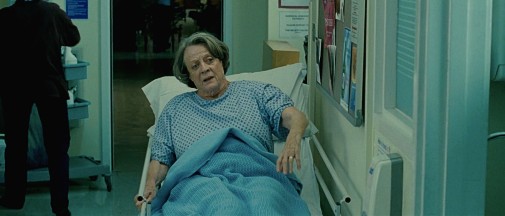
Time is running out for everyone in The Best Exotic Marigold Hotel, both young and old. On the one hand, there's Sonny Kapoor, an idealistic entrepreneur, and manager of a failing hotel in Jaipur, India. His business model consists of outsourcing the world's ailing elders, selling his establishment as an elderly home, a place of rest and repose where wealthy foreigners can come live their few remaining years. As for his guests, they're each facing mortality, staring in the face of death as it approaches at an increasing speed. Of course, this is a comedy, so the morbidity is kept at bay by an earnest desire for collective joy. Through trials and tribulations, Sonny and his cadre of elderly British people find autumnal contentment and a sense of community.
Not that you would think Maggie Smith's Muriel is in search of company. Not from her first scene, at least. Presented as a prototypical curmudgeon old lady, she's a racist menace laying around in a hospital corridor. Like a future Brexit voter, she refuses the aid of a Black doctor, demanding to be seen by a proper British man and going so far as to say that no washing will ever clean that skin color away. It's an odious introduction that Smith plays to the hilt, illuminating the ugly side of a thorny woman who lets her feelings of helplessness manifest in acerbic prejudice. However, unlike many a Smith character, Muriel can't back up her lousy attitude with either aristocratic pedigree or deep pockets.
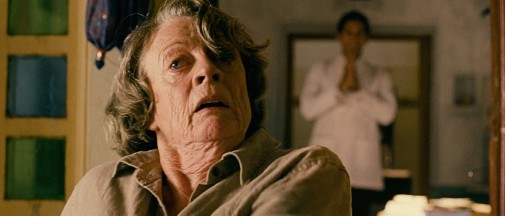
A former housekeeper, she's low on funds and in need of a hip surgery – a cheap one, if possible. In the end, that's what draws her toward Sonny's establishment. While every other character takes on their Indian pilgrimage in pursuit of happiness, Smith's Muriel is motivated by more pragmatic concerns. No wonder she's the grumpiest of the group, a veritable Scrooge who trudges along with a bag full of English treats like some sort of xenophobic food-based comfort blanket. As she astringently states: "If I can't pronounce it, I don't want to eat it." It's a testament to Smith's screen presence and comedic timing that Muriel is at all bearable during these early scenes.
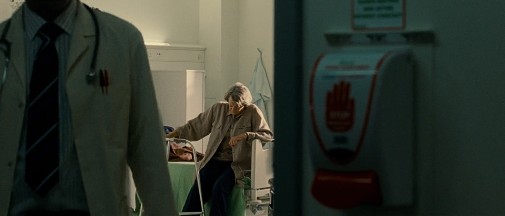
Another important detail is how the actress illustrates her character's fears, the genuine insecurity behind her more condemnable behaviors. When discussing the surgery with her doctor Smith weaves a thread of anxiety through the barbed one-liners, using her limited physicality – she spends most of the movie in a wheelchair – to suggest a woman desperate to shield herself from pain, impotence, infirmity. When one of the travel companions falls down at dinner, her proclamation that she's in hell is played for laughs but not denuded of pathos. Later on, recuperating from the procedure, she looks on the verge of tears, either from ache or an anguished sense of unmoored displacement.
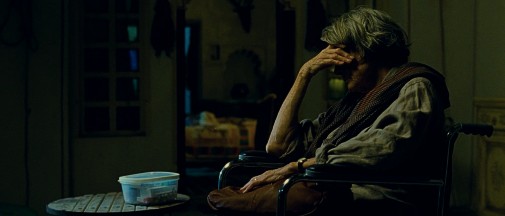
It's true she may not be doing much in the way of acting pyrotechnics, but Smith shows us a woman who hasn't known much comfort in life but still yearns for it, still needs it. At times, it feels as if castmates like Dench and Wilkinson are given opportunities to work within a milieu of delicate understatement that Muriel's writing precludes her from exploring. The script demands Smith be a blunt instrument for much of her screen time, only gradually revealing new facets to the character. Still, the actress knows how to build a foundation for Muriel's softening, going beyond the frailty of a sick old lady with a bad hip. The first signs of true change happen upon visiting her maid's family at the young woman's request.
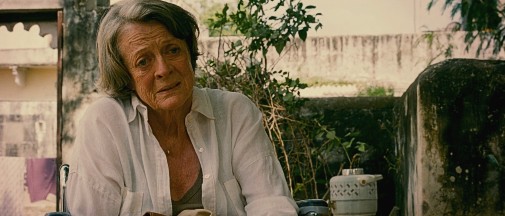
Flabbergasted by the kindness shown to her, Muriel reflects on her own cruelty, and Smith allows the shadow of shame to emerge. That feeling percolates, and blossoms into a flower of light. Muriel drops her emotional armor and reminisces about her life as a housekeeper, how her purpose eroded under the pressure of age and obsolescence. It's a touching monologue that Smith kills with the finesse the script has deprived her of until then. Each word hurts on its way out, but she still says them, an act of self-punishing vulnerability in the form of confessional musings. Afterward, it's like a weight has been taken off her back. Smith's entire disposition changes, becoming brighter, smiles erupting from her stern visage.
She also becomes more actively observant, modulating her reactions in a soft register that avoids the pitfalls of overt bitterness. Furthermore, Smith's Muriel grows to be the hotel's foremost advocate, its valorous savior. This dynamic would be expanded upon in the sequel, a film much more focused on Smith, where she gets to deliver what's perchance her best performance of the 2010s and finds a brilliant screen partner in the energized Dev Patel. The first Best Exotic Marigold Hotel may not be as good a showcase, but it's got its charms, and Smith is hard to resist. That being said, it's a pity how insular her arc is, preventing the actress from interacting with most of her veteran colleagues. You have Judi and Maggie in one movie, and they barely interact? What a shame.
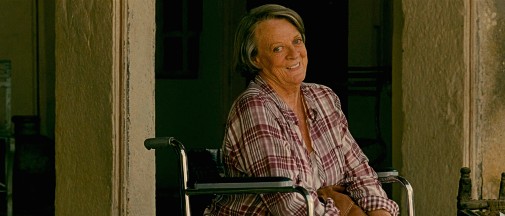
While The Best Exotic Marigold Hotel had its word premiere in 2011, its proper release at home and abroad came the following year, which means Maggie Smith campaigned for a nomination in the 85th Academy Awards honoring the films of 2012. Well, "campaigned" might be too strong a word, though that didn't matter much when Downton Abbey was still on TV, cementing Smith's fame and modern popularity. She was recognized by the British Film independent Awards and was nominated for the SAG. Indeed, she got four(!) nominations that year for her individual performances on film and TV, as well as the work in both ensembles. Towards the end of the season though, AMPAS ignored Smith. They nominated Amy Adams in The Master, Sally Field in Lincoln, Anne Hathaway in Les Misérables, Helen Hunt in The Sessions, and Jacki Weaver in Silver Linings Playbook. "Fantine" took the gold. Dame Maggie Smith hasn't been nominated since 2001 for Gosford Park.
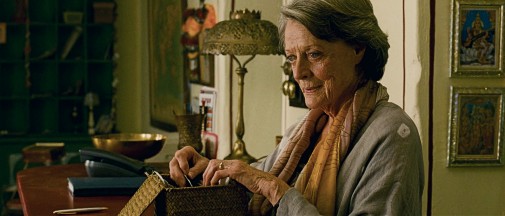
The Best Exotic Marigold Hotel is streaming on Disney+ and Starz.